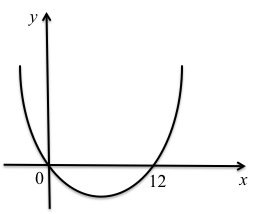harshvinayak wrote:
If \(\frac{4}{x} <\frac{1}{3}\) , what is the possible range of values of x?
The question is from an
MGMAT guide and the solution provided multiplies the inequality by x and flips the sign to arrive at the solution x < 0 or x > 12 . However the way I naturally would solve the given equation is:
\(\frac{4}{x} - \frac{1}{3} < 0\)
\(\frac{(12 - x)}{(3x)} < 0\)
Two cases:
a) \(12 - x < 0\) &\(3x > 0\) :: x > 12 & x > 0 therefore x > 12
b) \(12 - x > 0\) & \(3x < 0\) :: x < 12 & x < 0 therefore x < 12
Hence my solution: x < 12 or x > 12
Can someone kindly explain where I went wrong here?
Another way to solve this type of inequality:
From \(\frac{4}{x}<\frac{1}{3}\) it follows that \(x\neq0\), therefore we can multiply both sides by \(3x^2\), which is positive.
We obtain \(12x<x^2\) or \(x^2-12x>0.\)
Now, imagine the graph of the quadratic function, \(y=12x^2-x\), which is an upward parabola. See the attached drawing.
This parabola intercepts the X-axis at \(x=0\) and \(x=12,\) the two "arms" are above the X-axis, meaning the values of \(y\) are positive when \(x<12\) or \(x>0\), and the values of \(y\) are negative (graph under the X-axis) when \(0<x<12.\)
Hence the solution \(x<0\) or \(x>12.\)
Note: Just remember the shape of the parabola, then you can easily deduce the sign of the quadratic function \(y=x^2+bx+c.\) If the quadratic equation \(x^2+bx+c=0\) has two roots \(x_1<x_2\) then \(y<0\) (negative)
between the two roots and \(y>0\) (positive)
outside the roots.
Or succinctly, \(y>0\) if \(x_1<x<x_2\) and \(y>0\) if \(x<x_1\) or \(x>x_2.\)
Attachments

ParabolaUp.jpg [ 8.97 KiB | Viewed 13771 times ]











